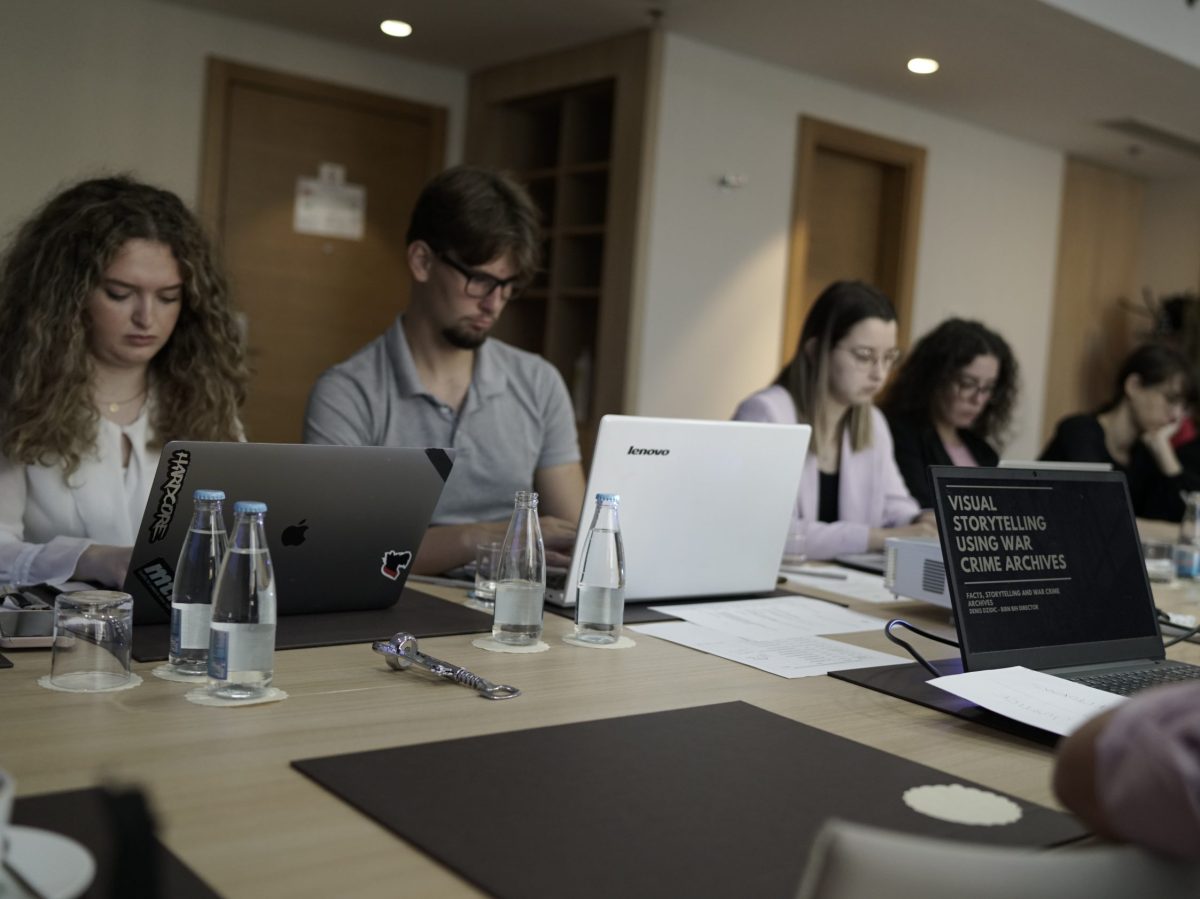Sinisa, 42, is half Croat and half Macedonian. He studied literature and anthropology but finished journalism. He has worked as a journalist for 17 years and this year celebrates his 15 years’ anniversary in BIRN.
Sinisa told us about his work and Balkan Insight’s virtual newsroom where differences become familiar commonalities, his favorite BIRN’s “Happy Friday” mantra, his noisy keyboard and BIRN’s new endeavor “European Focus” – a weekly newsletter published by Balkan Insight and nine European Media such as Domani, Delfi, Tagesspiegel, Hvg.hu, El Confidential, Gazeta Wyborcza, Liberation, and N-ost.
Let’s meet him:
- What do you like most in your job, and what is the most challenging thing?
Coming from a small country, born before the internet was a thing, who experienced first-hand as a teenager the breakup of former Yugoslavia and the isolation of the country that followed during the 1990s, not only from Europe, but from the immediate neighbors as well, to this day I consider it as my biggest achievement that through my work I have expanded my horizons and managed to keep the door with the outside world open.
Nothing makes me happier than the notion that I get to share and communicate daily with a group of talented people from so many different countries who work at BIRN, and realizing how many commonalities we actually share, both personal and societal. And whenever we meet in person, it’s a joy. It is a great asset to have in my career, sure, but it also makes me genuinely grateful.
As for the most challenging aspect, it is connected to the most joyous one. It is hat I work from home, or from a corner at my home that I’ve transformed into an office.
It is a blessing for some and a curse for others. For me it is a bit of both. Any journalist would tell you that it could be very challenging at times not sharing an actual physical space with your colleagues.
It helps a lot when you share your worries, laughs and “buying” or “selling” ideas with people in person. It eases up the day, nudges you in the right direction and motivates you to be better than yesterday. It is a base where you go to and you return to after each battle, to replenish your energy and motivation. If nothing else, it helps a person writing for a living, not getting stuck too much in his or her own head. Sadly, that natural human interaction that we all crave for is a little bit lost on the internet.
- Can you share a good memory of when you were on duty?
Being a duty editor in Balkan Insight sometimes resembles being a flight controller at the airport. You have to sort each article that flies your way, find its angle and place on the website and make it land well with the readers, while always multitasking and having the bigger picture in mind.
Having said that, I am happy to say that I have one good memory that reoccurrs each week. It is the “Happy Friday” exclamation each Friday at the morning editorial meeting that our Editor-in –Chief, Dusica Tomovic makes. I am fully aware that to an outsider this may sound totally lame. That’s OK. But for me it is a stress relief pill, acknowledgement that we are still here, we have almost made it through the stresses of the working week and a reminder to look forward to turning the “autopilot” at least for a while during the weekend.
- Besides your work, you are mostly known among people in BIRN as the editor with the noisy keyboard. Are you planning to change your keyboard?
I recently decided to look for a better keyboard. I figured out that for a person that spends so much time in front of the PC, a nicer keyboarded experience may be worth it. But to my horror, after paying an arm and a leg for a very expensive mechanical keyboard, I found out that the same soothing clicky sounds that my keyboard makes are the very sounds that annoy my colleagues when on a call.
I have to be honest. I have already spent my allowance for keyboards for the foreseeable future, and going back to the generic membrane keys of the old one is out of the question. So, sorry guys but no. I am not planning to change it.
I hope, though, that an ambient noise canceling software may help, and I pledge to look into it.
- Balkan Insight together with nine European media outlets publish together a weekly newsletter called “European Focus”. Tell us more about this cross-border initiative and its main scope
We started with the premise that Europe is not just Brussels, and surely not just the European Union nations, and that through cooperation with some of the best informative outlets across the continent, we can try to understand our common home a bit better.
We felt that while our nations share common challenges, national media alone are often not enough to offer European audiences the bigger European picture and often not able to connect the topics and discussions that are moving Europeans.
So we set up to try and offer this wider perspective that we feel our readers deserve. Thus, together with Tagesspiegel, El Confidencial, Liberation, Domani, Delfi, HVG.hu, Gazeta Wyborcza and N-OST we launched our joint weekly free of charge newsletter to cover topics that connect or affect us all and to exchange our different perspectives on them.
Our newsletter has five brief original pieces, which we also republish in the local languages of our different print and online publications to bring a variety of perspectives to our readers. And our hope is that this will enrich the essential debate in our joint European space.
- Each week journalists from nine different European newsrooms meet and decide European Focus’s context; how easy or difficult is this?
In professional terms, it is never easy to produce a good, well thought of, digestible yet informative and helpful newsletter. But we are not short of professional and enthusiastic colleagues from all corners of Europe, and not just from the aforementioned media outlets and organizations. So this enthusiasm and will to collaborate showed right from the start at our editorial meetings.
We are never short of ideas either. One colleague inspires another to try to look for similarities or differences in his or her own country, different angles, positive or negative examples. And just as we are thrilled, finding out new things and connecting the dots, we are sure that our readers will find the product of our work equally interesting and informative.
At the end of the entire process, of course, we have to decide on the topic of the week so we simply vote. It is plain and simple and as democratic as can be. Then we produce each newsletter jointly with a weekly rotating a team of five journalists and editors-in-chief.
- What kind of stories do you choose to present to the readers? How can you make multicultural readers be interested in these stories?
I must say, at the beginning of our cooperation, when we were still at the planning stage, we never imagined that the launch of our newsletter would coincide with the serious effects of the Russia aggression of Ukraine that has affected us all, from concerns about our security, to soaring fuel, electricity and food prices, all the way to how all these things fuel social and political movements in our countries.
And while at the beginning we felt, and still feel, compelled to tackle some of these issues that are undoubtedly shared among us all, causing great headaches but also inspiring great feats, we never feared that a European-focused newsletter could run out of topics, crisis or no crisis.
Be it the debate on EU enlargement, or the climate challenges or the worrying spread of wildfires this summer that showed that even countries like the UK are not unfazed by it, our Europe is simply too interesting to ignore, for good or for ill.
So we see the multiculturalism, multi-ethnicity and multi-confessionalism of our readers not as an obstacle but as our advantage. That is the whole point and our distinct European advantage, being able to compare, pinpoint the similarities, acknowledge the differences and simply try to learn from each other.
That was the thing that made us launch this newsletter and I believe that will be the thing that will keep our readers interested.






